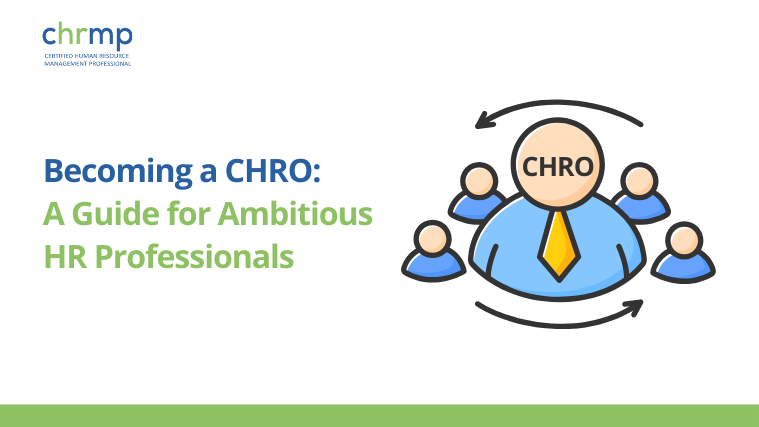The Chief Human Resources Officer (CHRO) is a critical leadership role that oversees the entire human resources function, aligning people strategies with business goals. Learning how to become a CHRO requires more than HR expertise—it demands business acumen, financial savviness, and a solid grasp of risk management. Whether you are in North America, Europe, or Asia, understanding how HR drives business growth is essential for those aiming for the C-suite.
Here are some ways in which you can accelerate your path to the C-suite and navigate the complex requirements of becoming a CHRO.
1. From HR Manager to Strategic Business Leader
To move up from an operational role to strategic leadership, mid-level HR professionals need to expand their focus from day-to-day HR management to long-term business strategy. This transition requires aligning HR initiatives with organizational goals and demonstrating a clear understanding of how HR impacts the bottom line.
- Develop business acumen:
Learn how HR affects profitability and operational efficiency. Take the time to understand key business metrics like revenue, profit margins, cash flows, etc. When working on projects like workforce planning or employee development, calculate how these initiatives impact revenue and profitability.
- Lead strategically:
Attend cross-functional meetings where financial performance and business strategy are discussed. This exposure will help you better understand how HR initiatives can support overall business growth. While working in fast-growing organizations, offer to lead a project related to talent acquisition for new markets or expansion into digital sectors. For example, Microsoft’s shift from annual reviews to continuous feedback was not just an HR improvement but a strategic move to align employee performance with the company’s growth goals.
2. Own Talent and Culture as Business Drivers
CHROs are responsible for much more than employee satisfaction. They play a crucial role in shaping company culture and ensuring that the talent strategy directly drives business outcomes. Mid-level HR professionals aiming for this role need to develop skills in managing organizational culture and diversity with a focus on measurable business impact.
- Shape culture transformation efforts:
Conduct a culture audit and identify gaps that could affect productivity or employee engagement. If your organization is entering a new market or undergoing a digital transformation, lead the charge in adapting the culture to sustain productivity and innovation. Lead efforts in harmonizing different company cultures if your company is part of a merger or acquisition (M&A).
- Champion DEI with business impact:
Link diversity, equity, and inclusion (DEI) to measurable outcomes. Diverse teams are often more creative and innovative, which directly impacts product development and market expansion. Implement real-time DEI tracking tools that measure the impact of inclusive hiring and leadership development on company performance.
3. Master Financial Understanding and Risk Management
HR professionals aspiring to be CHROs must demonstrate financial acumen and the ability to manage workforce-related risks. Understanding how to link HR initiatives to financial performance and mitigating risks is critical.
- Financial fluency:
Regularly sit down with your finance team to understand the company’s financial health. This knowledge will allow you to see how HR programs, such as compensation structures or employee development initiatives, affect the company’s finances. Calculate the ROI of HR initiatives and learn to create business cases for HR projects, presenting them in a way that highlights their financial return.
- Risk management and compliance:
Identify potential risks related to HR, such as non-compliance with labor laws, data breaches, or employee misconduct, and create a risk management plan. Partner with IT and cybersecurity teams to establish protocols around data privacy and secure access to HR systems.
4. Leverage Data to Drive Strategic Decisions
CHROs increasingly rely on data analytics to make informed decisions about talent strategy, workforce planning, and organizational development. Mid-level HR professionals need to deepen their understanding of HR analytics to forecast trends, track performance, and mitigate risks.
- Use analytics to mitigate risk:
Invest in data tools that offer people analytics and learn to interpret the data they provide, such as attrition rates, engagement levels, and talent gaps. Use predictive analytics to forecast skill shortages and track workforce productivity.
- Track the financial impact of HR initiatives:
Use data to demonstrate how HR programs improve overall business performance. Present analytics showing how employee retention, engagement, and productivity lead to better financial results, aligning HR strategies with the company’s financial goals.
5. Gain Cross-Functional, Global, and Security Experience
To excel as a CHRO, it is essential to work across departments and understand global business challenges. Cross-functional leadership and international exposure help HR professionals gain a broad understanding of how HR fits into the bigger picture, particularly when managing risk and security.
- Collaborate with other departments:
Partner with finance, operations, and IT. This will help you understand how HR strategies impact other business areas and how cross-functional collaboration drives company-wide success.
- Global exposure:
If your company operates internationally, familiarize yourself with the labor laws and employment regulations in different regions. Take on assignments that expose you to HR operations in other countries.
6. Build Leadership Influence and Crisis Management Skills
To become a CHRO, mastering leadership skills goes beyond managing teams—you must develop the ability to influence top-level decision-makers and lead organizations through significant challenges.
- Develop executive presence:
Position yourself as a strategic partner by contributing to strategic discussions and offering insights on organizational transformation. Work on communication and presentation skills so that you can present HR initiatives in a way that resonates with C-level executives.
- Master crisis management:
Lead during challenging times by volunteering to manage difficult situations, such as handling sensitive employee relations issues or managing workforce reductions. Create a crisis management framework within HR to respond swiftly to unforeseen challenges.
7. Build Global Networks and Secure Executive Sponsorship
Building relationships with C-level executives and securing sponsorship is critical for advancing to a CHRO role. These relationships offer you the visibility and advocacy needed to be considered for senior positions.
- Cultivate relationships with senior leaders:
Proactively build professional relationships with senior leaders across departments like finance, marketing, and operations. Identify senior leaders who can serve as your sponsor and engage in mentoring relationships with them.
- Participate in leadership forums:
Attend industry leadership forums, conferences, and global summits to connect with other senior leaders, share knowledge, and gain exposure to C-level dynamics.
Conclusion: The Path from Mid-Level HR to CHRO
The journey from mid-level HR professional to CHRO is a transformative one. It is not just about operational HR tasks but evolving into a strategic leader with a keen understanding of business acumen, financial performance, and risk management. By enhancing your leadership skills, expanding your global exposure, leveraging HR analytics, and building cross-functional partnerships, you can set yourself on the path to becoming a successful CHRO.
Remember, this journey is not linear or quick—it takes intentional development, gaining the right experience, and building the relationships that will position you for the C-suite. Focus on these strategic steps, and you will find yourself well on your way to earning the coveted CHRO title.



